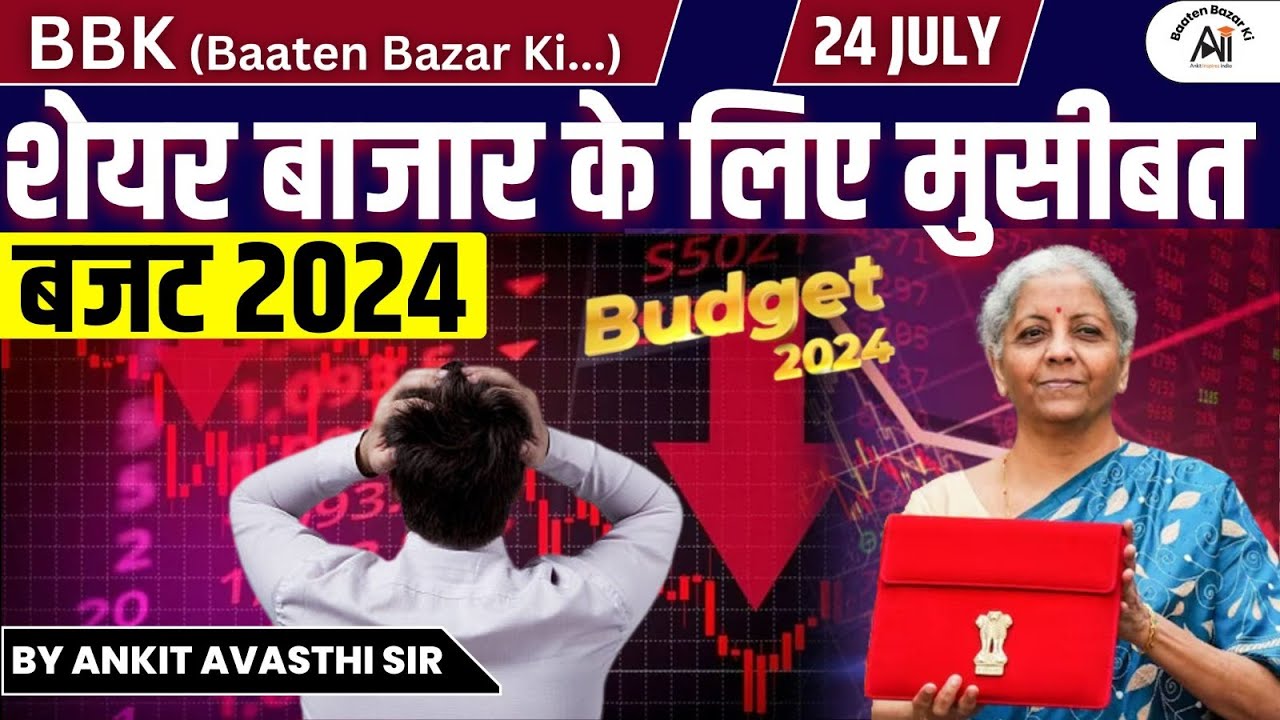Middle Class FOOLED Once Again? | Budget 2024 | Dhruv Rathee
Summary
TLDRThe video discusses the public's negative reaction to India's Budget 2024, highlighting increased taxes on capital gains and speculation on property prices. It also touches on the government's focus on unemployment, skilling schemes, and the distribution of funds among states, suggesting a need for more equitable taxation and support for the middle class.
Takeaways
- 😠 Public backlash against the 2024 Indian Budget is intense, with even staunch supporters of Prime Minister Modi expressing discontent.
- 💰 The government is perceived as targeting the middle class for tax revenue while providing benefits to the wealthy, leading to criticism of inequality.
- 📉 The budget has increased both Short-Term Capital Gains (STCG) and Long-Term Capital Gains (LTCG) taxes, affecting investors in stocks and mutual funds.
- 📈 The Economic Survey of 2023-2024 suggests that the government is concerned about stock market instability, indicating a rationale for discouraging excessive market growth.
- 🏦 The removal of indexation benefits on property transactions might curb property price speculation but could also impact those who bought properties at lower prices and face higher taxes.
- 📚 The government acknowledges a severe unemployment problem and the lack of employable skills among Indian graduates, proposing job creation and skilling schemes.
- 🤖 The Economic Survey also highlights the disruptive impact of Artificial Intelligence on jobs, creating uncertainty across all skill levels.
- 🏘️ The budget proposes various employment and skilling initiatives, including financial support for first-time job seekers and incentives for employers to hire more staff.
- 💼 The budget's changes to income tax slabs offer minor benefits to the middle class, but the overall impact is considered negligible compared to previous governments' efforts.
- 💎 The criticism of the 'Angel Tax' on startups is addressed by the government's proposal to remove it, a move that has been well-received.
- 🗳️ The budget's allocation of funds to specific states like Andhra Pradesh and Bihar is seen as politically motivated, with the opposition dubbing it a 'Seat Conservation Budget'.
Q & A
What was the public's reaction to Budget 2024 presented by Finance Minister Nirmala Sitharaman?
-The public's reaction to Budget 2024 was largely negative, with even the biggest supporters of Prime Minister Modi expressing anger against the government due to perceived unfair tax policies.
What is the main criticism regarding the tax policies in the 2024 Budget?
-The main criticism is that the budget seems to squeeze money out of the middle class while providing benefits to the wealthy, including millionaires and billionaires, which is seen as unfair.
How did the budget address the issue of income inequality in India?
-The budget did not directly address income inequality, but the speaker in the script suggests that the government should focus more on promoting the growth of the middle class and taxing the wealthy more.
What changes were made to the Capital Gains tax in the 2024 Budget?
-The budget increased both Short-Term Capital Gains (STCG) tax from 15% to 20% and Long-Term Capital Gains (LTCG) tax from 10% to 12.5%. However, the exemption limit was also increased from ₹100,000 to ₹125,000.
What is the significance of the Economic Survey of 2023-2024 in relation to the budget?
-The Economic Survey is an annual report that provides a backdrop to the budget. It suggests that the government is concerned about the stock market turning into a bubble and becoming a source of market instability, which may have influenced the tax changes in the budget.
How does the budget affect Futures and Options trading?
-The Securities Transaction Tax on Futures and Options trading has been increased, which is seen as bad news for those engaged in such trading activities.
What are the implications of the changes to the Long-Term Capital Gains tax on Non-Financial Assets?
-While the LTCG tax rate on Non-Financial Assets has been reduced from 20% to 12.5%, the removal of indexation benefits means that the tax calculation will not account for inflation, potentially leading to a higher tax burden for some.
What is the government's stance on the issue of unemployment as per the Economic Survey?
-The Economic Survey acknowledges the issue of unemployment and suggests that creating 7.85 million jobs per year until 2030 is necessary. It also points out that many Indian graduates lack the skills needed for employment.
How does the budget address the issue of Angel Tax on start-ups?
-The budget proposes to remove the Angel Tax, which is a tax imposed on start-ups when they issue shares at a higher price than their fair market value, a move that has been praised by various parties.
What minor changes to the Income Tax were made in the budget that could benefit the middle class?
-The Standard Deduction has been increased from ₹50,000 to ₹75,000, and there were adjustments to the tax slabs, which could provide minor benefits to the middle class, depending on their specific financial situation.
What are the criticisms regarding the distribution of budget allocations among different states?
-The budget has been criticized for favoring certain states like Andhra Pradesh and Bihar, possibly for political reasons, while other states have been comparatively neglected.
What is the speaker's suggestion for addressing income inequality in India?
-The speaker suggests that the government should focus on promoting small businesses, taxing the billionaires more, and ensuring that the growth of the middle class is prioritized.
Outlines

このセクションは有料ユーザー限定です。 アクセスするには、アップグレードをお願いします。
今すぐアップグレードMindmap

このセクションは有料ユーザー限定です。 アクセスするには、アップグレードをお願いします。
今すぐアップグレードKeywords

このセクションは有料ユーザー限定です。 アクセスするには、アップグレードをお願いします。
今すぐアップグレードHighlights

このセクションは有料ユーザー限定です。 アクセスするには、アップグレードをお願いします。
今すぐアップグレードTranscripts

このセクションは有料ユーザー限定です。 アクセスするには、アップグレードをお願いします。
今すぐアップグレード関連動画をさらに表示

SHARE MARKET के लिए मुसीबत..BUDGET 2024...Explained by Ankit Avasthi Sir

STOP Investing in Real Estate: The Worst Asset Ever!

Comprehensive Analysis of Union Budget 2024 | Initiatives, Schemes and Statistics Explained

how long term capital gain tax rule will benefits or become curse real estate

Autumn Budget 2024: How “Painful” Will It Be?

Budget 2024 : Biggest mistake of the Modi govt? | Complete analysis
5.0 / 5 (0 votes)
